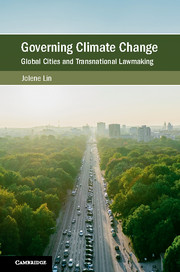Book contents
- Governing Climate Change
- Cambridge Studies on Environment, Energy and Natural Resources Governance
- Governing Climate Change
- Copyright page
- Contents
- Acknowledgements
- Abbreviations
- 1 Global Cities, Climate Change, and Transnational Lawmaking
- 2 Theoretical Framework
- 3 The Rise of the City in International Affairs
- 4 City Action on Climate Change
- 5 Transnational Urban Climate Governance via Networks: The Case of C40
- 6 Cities as Transnational Lawmakers
- 7 A Normative Assessment of Urban Climate Law
- 8 Conclusion
- Select Bibliography
- Index
5 - Transnational Urban Climate Governance via Networks: The Case of C40
Published online by Cambridge University Press: 04 June 2018
- Governing Climate Change
- Cambridge Studies on Environment, Energy and Natural Resources Governance
- Governing Climate Change
- Copyright page
- Contents
- Acknowledgements
- Abbreviations
- 1 Global Cities, Climate Change, and Transnational Lawmaking
- 2 Theoretical Framework
- 3 The Rise of the City in International Affairs
- 4 City Action on Climate Change
- 5 Transnational Urban Climate Governance via Networks: The Case of C40
- 6 Cities as Transnational Lawmakers
- 7 A Normative Assessment of Urban Climate Law
- 8 Conclusion
- Select Bibliography
- Index
Summary
INTRODUCTION
In their attempts to reduce GHG emissions and adapt to the impacts of climate change, cities have found it helpful to establish networks through which they can facilitate policy learning and develop new governance approaches. The information and communications revolution has made such networking easier, more affordable, and quicker. These networks connect city officials across the world; they are therefore cross-border and transnational in nature. Transnational municipal networks also serve as conduits through which cities can create and implement urban-specific norms, practices, and voluntary standards that support and complement the international legal regime on climate change. In addition, these networks have formed linkages and partnerships with national authorities, international organizations, multinational corporations, and civil society. They therefore also perform the function of linking cities to other actors in the transnational climate change regime complex. By disseminating knowledge about urban climate change practices to other governance actors through these networks, cities have the potential to shape the norms and practices of other actors.
This book is not concerned with cities broadly speaking, but rather with global cities that command significant economic and political resources and are leading the current wave of urban climate action. This chapter therefore focuses on C40, which has become widely recognized, within a decade of its founding in 2005, as the leading network of global cities addressing climate change. C40 positions itself as a gathering of the top echelon of the world's major cities, a ‘space of engagement’ for cities gathered to exchange expertise and knowledge on climate change as well as a catalyst representing (and creating more) connections amongst major cities. In seeking to present cities as significant actors in the global response to climate change, C40 has emphasized the global nature of its cities, because global cities are widely understood to be of pivotal importance in the global economy and enjoy a higher status compared to other cities. C40 seeks to support the UNFCCCregime but also underpins its legitimacy on the claim that cities are forging ahead with practical and innovative climate mitigation and adaptation measures while international climate negotiations have proceeded at a glacial pace (at least until the COP in Paris in December 2015).
- Type
- Chapter
- Information
- Governing Climate ChangeGlobal Cities and Transnational Lawmaking, pp. 105 - 126Publisher: Cambridge University PressPrint publication year: 2018
- 2
- Cited by

